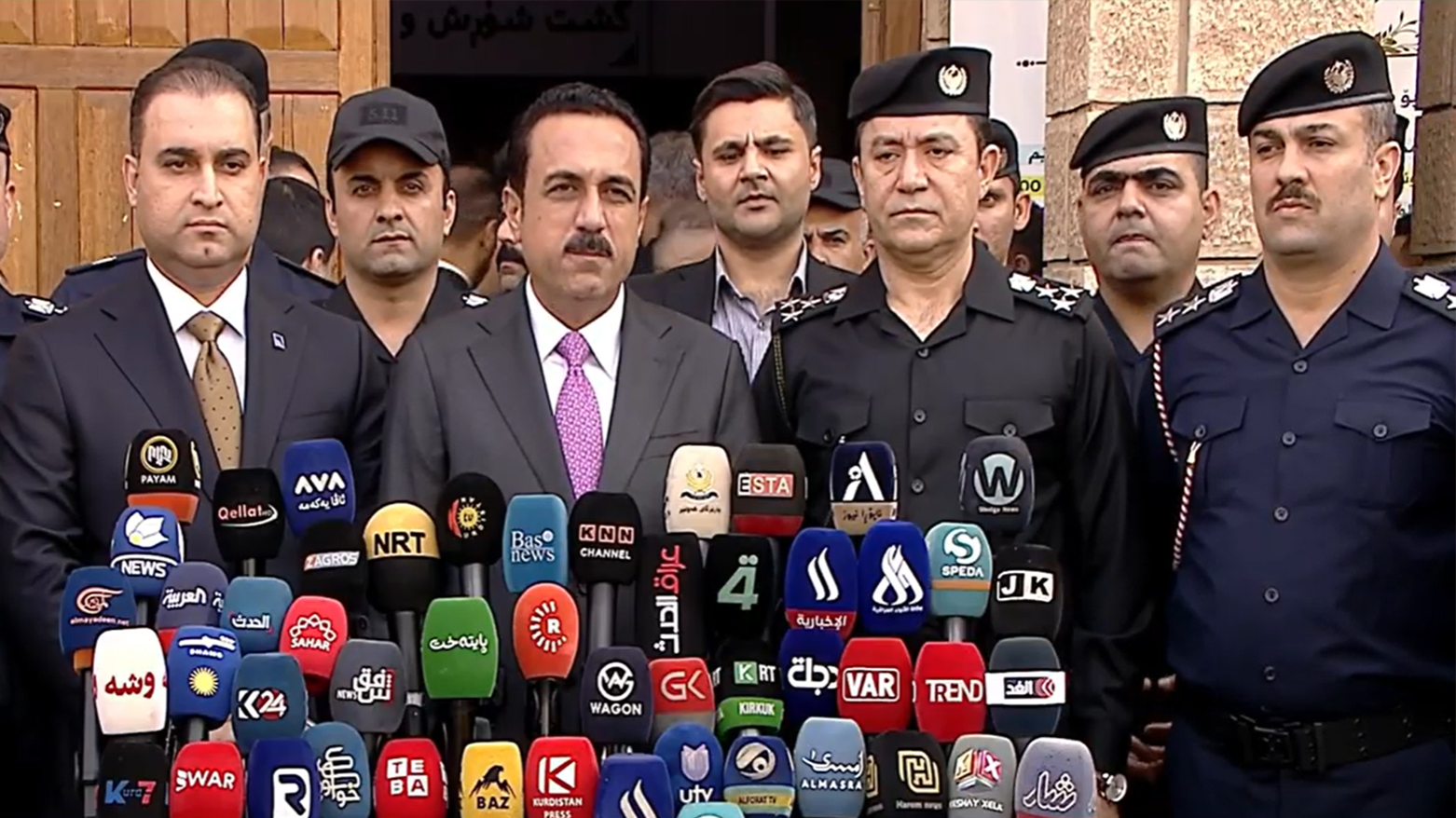Erbil and Soran Officials Hail “Flawless” Special Voting Process in Iraq’s Parliamentary Elections
They confirm smooth early voting across polling centers, saying “the issue of fingerprint recognition failures, common in previous elections, has been fully resolved.”

ERBIL (Kurdistan24) — Erbil Governor Omed Khoshnaw announced on Sunday that the special voting process in Erbil is proceeding “without any issues or disruptions,” as members of Iraq’s security forces and internally displaced populations cast their ballots ahead of the Nov. 11 parliamentary elections.
Speaking at a press conference in Erbil, Khoshnaw said that, with the coordination of the Independent High Electoral Commission’s (IHEC) Erbil office, the provincial police directorate, and the security committee, he had visited several polling centers in the province and found that “the special voting process is running smoothly in all locations.”
According to Khoshnaw, 111,839 special voters were eligible to cast their ballots across 79 centers and 385 polling stations in Erbil province.
He confirmed that all biometric devices were functioning properly, adding that “the issue of fingerprint recognition failures, common in previous elections, has been fully resolved.”
“Our polling equipment is newly updated, and no significant technical problems have been reported,” he added, expressing gratitude to the IHEC, security forces, and administrative teams for their coordination in ensuring the success of this crucial democratic process.
Meanwhile, Halgurd Sheikh Najib, head of the Soran Independent Administration, echoed similar remarks during a separate press briefing, affirming that the early voting process in his jurisdiction had been “100 percent problem-free.”
Sheikh Najib noted that voting began at 7:00 a.m. across 14 centers and 61 polling stations with 17,842 registered special voters.
He emphasized that an operational control room had been established to monitor the process in real-time and coordinate with IHEC to resolve any potential issues immediately.
“The technical challenges that plagued past elections—such as fingerprint scanner errors or unreadable biometric cards—are entirely absent this time,” he said. “Only two minor face ID issues were reported and swiftly resolved. We can confidently say that Soran’s process was flawless.”
Sheikh Najib described Sunday’s special voting as “a highly successful rehearsal” for the nationwide vote, expressing hope that the general elections on Tuesday will proceed with the same level of efficiency and transparency.
More than 1.3 million members of Iraq’s security forces and over 26,000 internally displaced persons, mostly in Duhok province, were eligible for early voting across 809 polling centers nationwide.
The special vote, which began at 7:00 a.m. local time, is set to continue until 6:00 p.m.
IHEC has stated that all ballots are being cast electronically and that the process will not be extended beyond the scheduled hours.
Jumana Ghalai, spokesperson for IHEC, told Kurdistan24’s correspondent in Baghdad, Saif Ali, in the early hours of Sunday morning that the early voting process began smoothly and on time, across all provinces of Iraq and the Kurdistan Region.
Ghalai confirmed that “no technical malfunctions” had been recorded in any of the electronic voting devices and that the entire process had launched successfully nationwide.
In a statement to Kurdistan24, another commission official confirmed that all polling stations opened on time, electronic voting machines were functioning flawlessly, and praised the disciplined participation of Iraq’s security forces—painting a picture of a well-organized and secure start to the democratic exercise.
Hassan Hadi, a member of the IHEC media team, provided further details, noting that “since 7:00 AM, more than 800 polling stations have been opened to welcome more than one million and 300 thousand special voters.”
He emphasized that the voting process “is proceeding very well and without any problems, and all centers and stations were opened at their designated times.”
The success of the logistics, Hadi said, was due not only to the Commission’s planning but also to “the cooperation of the voters themselves,” as he commended the security forces for “organizing their members to participate in the voting process.”
Ghalai also addressed questions about the traditional use of indelible ink for voter verification, explaining that the practice is no longer necessary due to the nationwide rollout of biometric voter cards.
“The use of ink has become purely symbolic and no longer essential,” she stated, pointing to the three-stage verification system that links each voter’s live fingerprint to their biometric card and the ballot machine, ensuring transparency and preventing fraud.
This advanced system, she added, represents a major step forward for election integrity, offering full real-time verification before any ballot is cast.
The general vote on Nov. 11 marks Iraq’s sixth parliamentary election since the 2003 U.S.-led Operation Iraqi Freedom, a crucial moment in shaping the country’s future amid growing voter scepticism, security challenges, and renewed international scrutiny of Iraq’s political alliances and governance.
